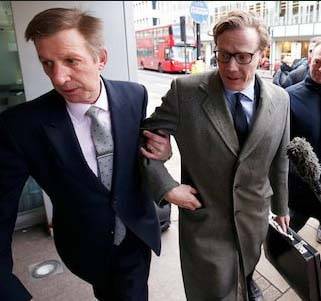
This article is from the Winter 2013 issue of New Humanist magazine. You can subscribe here.
Michael Ignatieff’s career could have been specifically scripted to provide the pleasures of schadenfreude to someone like me. For those of us harbouring media and academic pretensions, there was always something about his absurdly gilded career that was intensely irritating: the aristocratic Russian-Canadian family, the boarding school (he was a prefect) and then Oxford, where he was taught by Isaiah Berlin, the prolific writing (14 scholarly works, three novels, screenplays and reams of columns for the Observer and New York Times), the prime slot as presenter on the BBC’s flagship arts programme, the fearless travel through the world’s trouble spots in the name of human rights, the prizes, the 11 honorary doctorates, the plum Ivy League professorship. It hardly makes it better that he is also handsome enough to have once been dubbed Canada’s “Sexiest Cerebral Man” by Maclean’s magazine.
In 2005, when he surprised many by quitting academia to take a run at Canadian politics, it seemed inevitable that he would follow in the footsteps of his hero, that other political pin-up Pierre Trudeau, as Canadian Prime Minster. So when in the elections of 2011 he failed, and failed spectacularly, overseeing the virtual destruction of the Liberal Party, the news was greeted by (admittedly green-eyed) Ignatieff watchers with no little delight. “Michael Ignatieff made history,” conceded the Canadian newspaper The Globe and Mail, the day after the election, but only “as the Liberal Leader who took his party to new lows”. Ouch. Granted, it is not entirely his fault that he is high born, good-looking and talented. But in thinking he could sweep into Canadian politics, having lived outside his country of birth for decades, elbow aside the hard-bitten pros and grab the top job, hadn’t he really reached too far? Surely he got what he deserved?
So I turned to my copy of Fire and Ashes, Ignatieff’s memoir of his ill-starred six-year political career, with relish. Surely here would be confirmation of the sheer brass neck of the man, a document of his hubris? The first thing I noticed, however – with a tinge of both disappointment and grudging respect – was that, once again, Ignatieff had got there first. The very first chapter is called “Hubris” (and the next one “Ambition”). Ignatieff, damn him, is too smart not to acknowledge, right up front, that it was indeed his own arrogance and desire for political glory that were his undoing. He makes no bones about why he did it, either. As was obvious to all, he was not drawn into politics because he wished to fix the potholes of rural Ontario. He wanted to run the country. And, because he wanted it so badly, and was so used to success, he came to believe it was possible. History thought differently.
It starts like a thriller. It’s October 2004. Three shadowy figures materialise one night in Cambridge, Massachusetts, seeking an audience with Professor Ignatieff, then ensconced as Carr Professor of Human Rights Policy at Harvard. These “men in black” reveal themselves to be heavyweight Liberal Party fixers, disenchanted with then Liberal PM Paul Martin. They were testing the water for an audacious plan. Could Ignatieff, they wondered, be tempted to run as an MP, with a view to unseating Martin as Liberal leader and then taking a tilt at the Premiership? You would not be reading this if the answer had been “no”. The purpose of his book, Ignatieff says, is to try and explain why “a person like me succumbed, so helplessly, to hubris.”
But if Fire and Ashes is part confessional it is in equal part self-justification. Though he is prepared to take a share of the blame, he is keen also to point out how political double dealing, scurrilous campaign ads, an intrusive always-on media and the fact that it doesn’t matter how sincere you are if the voters think you aren’t all played their part in his downfall. Sometimes it feels like special pleading, as in the early passage on his political family. He makes much of the diplomatic career of his father, George, and the various political big beasts in his mother’s clan, the Grants. His insistence that – despite his glittering career elsewhere – he always shared his family’s “calling for public life”, that politics for the Ignatieffs is “in the blood”, seems like a calculated rebuttal to the snarky, and highly effective, attack ads orchestrated by his nemesis, Conservative leader Stephen Harper, informing the Canadian electorate that “he didn’t come back for you”.
He may have felt that revealing that he used to give political speeches to himself as he walked to school further strengthened the case, but appears unaware that it also fuels the impression that he was always possessed of an inflated self-importance. As an insight into the psychology of ambition it’s fascinating; as proof of his interest in the real nitty gritty of Canadian domestic politics, less so.
The narrative, packing six years into fewer than 200 pages, moves as swiftly as his political career. By November 2005 the fracturing Liberal government lost a parliamentary vote of confidence and Paul Martin called a snap election for the following January. Ignatieff assembled an enthusiastic young team and hit the hustings. By election time his vibrant campaign had surged, winning him the Ontario seat of Etobicoke-Lakeshore, though the national trend saw Liberal losses, and Conservative Stephen Harper secured a narrow majority. This, of course, suited someone looking to unseat the Liberal old guard and just eight weeks later Ignatieff declared his candidacy for the Liberal leadership.
Superficially things were going according to plan, but Ignatieff admits to making critical mistakes: a careless remark to a reporter on Quebec became an embarrassing talking point; denunciation of Israeli “war crimes” in Lebanon alienated vital Jewish voters; worst of all, the Liberal leadership battle descended into acrimony. After a brutal campaign he narrowly lost the vote, only to finally become leader in December 2008 following the economic crisis and an election that failed to win Harper a workable majority.
Almost there. What follows is four years of hard campaigning and even harder backroom dealing during which, in Ignatieff’s telling, his political enemies comprehensively destroyed his “standing” in the eyes of the electorate, successfully depicting him as the carpetbagger who, in the words of another stinging attack ad, was “just visiting”. On 1 May 2011 the Canadian electorate handed him his political career in a basket. Even cynics will find it hard to resist the poignancy of the scene at what should have been his victory party – the humiliated candidate climbing the stairs to the podium at midnight to address his shell-shocked staff, as the ballroom of the Toronto Hotel rapidly empties.
Canadian reviews of the book have been split, no doubt reflecting the political partisanship of the country. Robert Collison reviewing for The Star calls it “a brilliant cautionary tale” and compares it to Machiavelli’s The Prince, written after a similarly devastating political downfall (a comparison, it is worth noting, that Ignatieff himself provides). By contrast, political veteran Scott Reid, writing in the Ottawa Citizen, found it “a barely sufferable journey of self-absolution” and mocks “Ignatieff’s obvious desire to provoke our sympathies while insisting unconvincingly that he is looking for no such mercy”.
From an outsider’s perspective Collison seems closer to the mark. Long after the details of the 2011 Canadian election are forgotten, anyone interested in democratic politics will be reading this book. As both an access-all-areas insider’s guide to the machinations of power and a powerful account of (and, just as fascinatingly, an example of) the weird psychology of ambition, it is a riveting read.
It’s also an honest book; both for what Ignatieff is prepared to admit about his own shortcomings and for what it reveals about his creepy politicial vision. In the final chapter, portentously titled “The Calling”, he likens politics to a kind of pseudo-religious vocation that serves to suggest that, whether or not he agrees with the Canadian voters that he wasn’t prime-ministerial material, they knew what they were doing. Had they gone the other way they could have wound up with a leader every bit as preachy and sanctimonious as our own Tony Blair. And look how that turned out.
Fire and Ashes: Success and Failure in Politics by Michael Ignatieff is out now (Harvard University Press £18.95)

